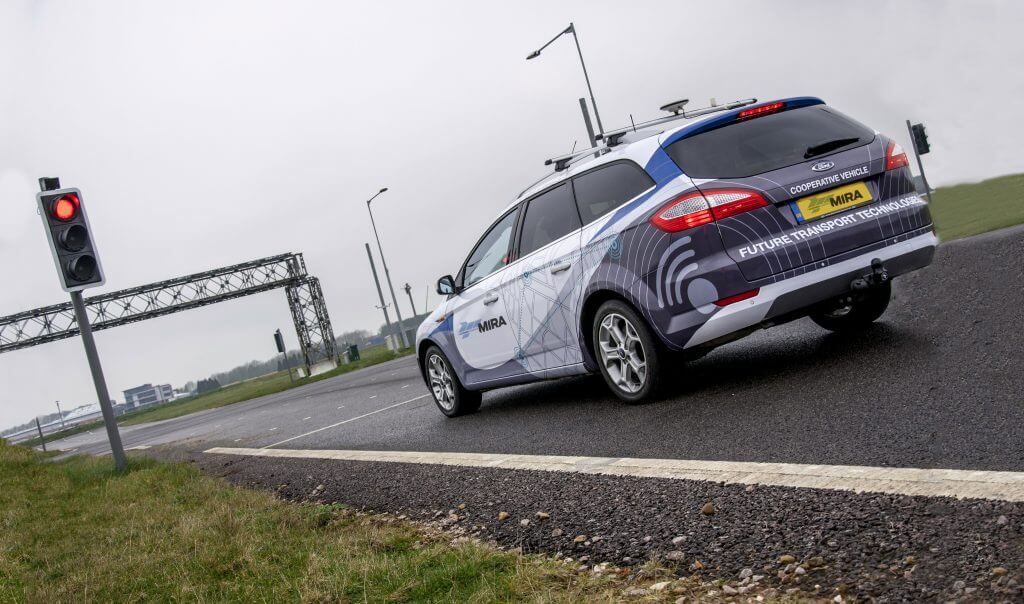Verification of Connected and Autonomous Vehicles (VeriCAV), a new connected and autonomous vehicles (CAV) project exploring how simulated environments can support the development of self-driving technology, has launched its website today.
The VeriCAV project is developing an integrated test framework to allow Automated Driving Systems (ADS’s) to be validated in simulation, exposing them to large numbers of complex driving situations such that developers and regulators can have real confidence in their reliability and safety when deployed on the roads.
Performing physical vehicle tests for ADS is becoming increasingly time consuming, resource heavy, and expensive. Simulation opens the doors to very large numbers of scenarios including complex and uncommon situations that complement the need to physically test the system.
Chris Reeves, Head of CAV Technologies at HORIBA MIRA, said, “CAV technology is transformational and opening up huge commercial opportunities. It’s not, however, without major technical challenges in product development and the need to determine the functionality, safety and security of these systems using industry best practice test and validation processes. Simulation and modelling techniques will increasingly form part of the verification and validation methodologies and are critical in speeding up and reducing the cost of CAV product development.”
The VeriCAV simulation will mean significantly improving test efficiency when evaluating countless driving scenarios. Simultaneously it can replicate the behaviour and actions of obstacles in a realistic and consistent manner, utilising the latest in ‘smart actor’ physical and simulated technology.
Smart actors will represent other vehicles and pedestrians that interact with the ADS. Sophisticated decision-making actors within a virtual test environment do not currently exist in any commercial product, yet they are central to injecting real-world variability into tests that do not rely on human involvement.
Connected Places Catapult COO, Neil Fulton, added, “We’re delighted to be a part of this ground-breaking project, which brings together a world-leading engineering and test facility, the best of British SME innovation, plus renowned UK academic expertise, to revolutionise how CAVs are tested and implemented. This could be a game-changer; advanced simulation can help all sectors involved in introducing driverless cars to the roads understand the challenges and discover the solutions so that our future transport system is safe, efficient, environmentally- and user-friendly.”
Led by HORIBA MIRA, VeriCAV consortium partners include: Latent Logic, Aimsun Ltd., the University of Leeds, and the Connected Places Catapult.
###
Project media contact
For more information about VeriCAV or to request media interviews, please contact Natasha Moore, CAV Projects Marketing Coordinator, Connected Places Catapult (natasha.moore@cp.catapult.org.uk) Liam Singleton, CAV Projects Communications Manager, Connected Places Catapult (liam.singleton@cp.catapult.org.uk; tel: +44 (0)7741 076 745).
Notes to editors
The VeriCAV consortium was awarded the funding as part of the Centre for Connected and Autonomous Vehicles (CCAV) and Innovate UK competition to invest in industry-led, collaborative research and development projects in the area of CAV simulation. It is the first stage of CCAV’s approach to enhancing the UK’s testing ecosystem through simulation and modelling. The project began early 2019.
About HORIBA MIRA
HORIBA MIRA is a global provider of pioneering engineering, research and test services to the automotive, defence, aerospace and rail sectors. We work in close collaboration with vehicle manufacturers and suppliers around the world, providing comprehensive support ranging from individual product tests to turnkey multi-vehicle design, development and build programmes.
With over 70 years’ experience in developing some of the world’s most iconic vehicles, our engineers utilise the latest test facilities and simulation tools to make vehicles and journeys safer, cleaner and smarter. Our suite of 40 major test facilities, 100km of specialised proving ground and wealth of engineering experience, combined with our expanding international presence, means we are confident that we can achieve our vision – that every journey in the world will be positively influenced by us.
About Latent Logic
Latent Logic is a spin-out of the award-winning machine learning department at Oxford University. The company uses state-of-the-art computer vision and deep learning techniques to develop smart-actor models for autonomous car simulation. In 2018, Latent Logic (formerly Morpheus Labs) was selected as one of Nvidia’s “top 4 global Autonomous Systems start-ups” due to its innovative AI solutions. For more information visit www.latentlogic.ai
About Aimsun Ltd.
Aimsun develops the integrated Aimsun Next mobility modelling software, which provides an accurate and cost-effective simulation environment for testing connected and autonomous vehicles. The simulated Aimsun Next environment is a way to accurately investigate the impacts of different CAV systems, including vehicle management and control strategies, as well as the impact of robustness issues such as information delays, data integrity, and black spots in connectivity and communications.
Now with offices in Barcelona, London, New York City, Paris, Portland, Singapore, and Sydney, Aimsun software has over 4,500 users around the world, including government agencies, consultancies and research institutions. For more information visit www.aimsun.com
About University of Leeds
The University of Leeds is one of the largest higher education institutions in the UK, with more than 33,000 students from more than 150 different countries, and a member of the Russell Group of research-intensive universities. We are a top ten university for research and impact power in the UK, according to the 2014 Research Excellence Framework, and are in the top 100 for academic reputation in the QS World University Rankings 2018. Additionally, the University was awarded a Gold rating by the Government’s Teaching Excellence Framework in 2017.
The Institute for Transport Studies (ITS) is the host of the University of Leeds Driving Simulator and a leader in humanising Automated Vehicle technology. The Institute’s primary purpose is to advance the understanding of transport activity, operations and use, and to develop skills and best practice among transport professionals and decision-makers. ITS is a leading international centre for transport research. It is particularly notable for the breadth and depth of research, the international quality of which has been verified by Research Assessment Exercise (RAE) stretching back over a period of 20 years. The research is sponsored by a variety of organisations, including the UK Department for Transport, the European Commission, and the Engineering and Physical Sciences Research Council. ITS was also the first academic unit in Britain to achieve ISO 9001 accreditation for research management. ITS is a free-standing academic department of the University of Leeds and part of the Faculty of Environment.
Virtuocity is a centre for city simulation bringing together expertise from the University of Leeds’ major research facilities – including the University of Leeds Driving Simulator and Leeds Institute for Data Analytics. The University has extensive and internationally-recognised research experience across the disciplines of social sciences, engineering and medicine. Virtuocity combines these, so that any researcher can use them in their investigations. Corporate and public partners also integrate their software, simulations, data and models thereby maximising the research capability of Virtuocity. An interactive environment centred around accurate virtual models of cities for decision-makers, business partners and researchers is at the heart of Virtuocity to help explore scenarios and test new systems. Partners are provided with a competitive edge through access to a unique combination of facilities, world leading research and key academic expertise to accelerate the creation of innovative solutions. www.leeds.ac.uk
About Connected Places Catapult
The new name for the Transport Systems and Future Cities Catapults.
The new Connected Places Catapult will accelerate smarter living and travelling in and between the places of tomorrow. We will focus on growing businesses with innovations in mobility services and the built environment that enable new levels of physical, digital and social connectedness. The Connected Places Catapult will operate at the intersection between public and private sectors and between local government and transport authorities. We will convene the disparate parts of the market to help innovators navigate the complexity of doing business, creating new commercial opportunities and improving productivity, socio-economic and environmental benefits for places. Find out more: https://cp.catapult.org.uk/

 HORIBA MIRA test vehicle
HORIBA MIRA test vehicle